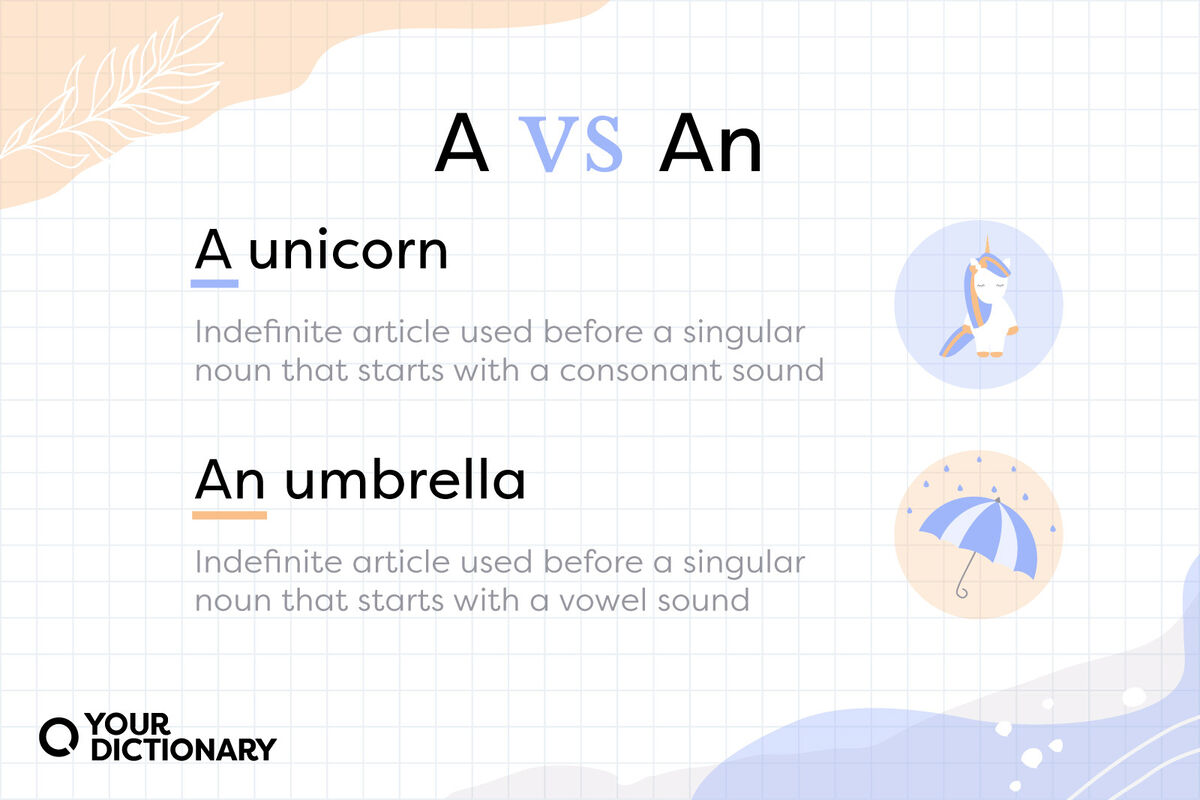
You probably know that a comes before a word starting with a consonant and an is used before a word starting with a vowel. But what about those tricky words that don’t sound quite right when you follow the rule? Learn how to use a and an with these example sentences.
A and An: Know the Difference
Both a and an are indefinite articles for singular nouns. When the next word begins with a consonant sound, you use a. You can tell when to use an instead of a if the next sound is a vowel sound.
A misunderstanding of the rule is that you need to pay attention to the actual letter of the next word. In reality, it’s the sound of the word that you should follow when deciding to use a or an.
Examples Using A in a Sentence
The article a typically comes before a word that begins with a consonant sound. Examples of when to use a include:
-
I went to a restaurant. (The next sound is r)
-
A man was driving too fast. (The next sound is m)
-
A dog barked all night. (The next sound is d)
-
Sharon decided to read a book. (The next sound is b)
-
Joel drives a purple Audi. (The next sound is p)
Examples Using An in a Sentence
Use an when the next sound begins with a vowel sound. For example:
-
I bought an umbrella just before the rain started. (The next sound is uh)
-
The news reported an alligator attack. (The next sound is ah)
-
Lily wanted an ice cream cone. (The next sound is eye)
-
An eager child ran into the store. (The next sound is ee)
-
The boy picked up an orange cup. (The next sound is oh)
Using A or An Before Acronyms
Just like in other words, you are listening for the initial sound, not necessarily the letter when writing acronyms. Take a look at these examples of acronyms in which you pronounce each letter individually (also known as initialisms).
- an MBA (first sound is em)
- a GRE (first sound is gee)
- an NFL coach (first sound is en)
- a DOJ employee (first sound is dee)
- an SOS signal (first sound is es)
If you say the acronym as a single word, such as NATO or AIDS, refer to the first sound of the word: a NATO treaty and an AIDS treatment. It may seem complicated, but as long as it sounds right, you are probably on the right track
Which Article Should You Place Before H?
It’s hard to tell whether you should use a or an before “h” words. The rule dictates that if the first syllable is not stressed, you can use an. Additionally, some words have the “h” sound at the beginning, while it is silent in other words.
When to Use An Before a Word Beginning with H
Even though they all begin with the consonant “h,” these words use the article an:
- an honor (first sound is ah)
- an heir (first sound is eh)
- an hourglass (first sound is ow)
When to Use A Before a Word Beginning with H
When the first sound is a hard “h,” the article will almost always be a.
-
a horse
-
a hair
-
a home
A tricky word not listed above is historic. That’s because the "h" is not silent, but the first syllable is also not stressed (hi-STOR-ic). However, many people write and say "an historic" and the grammar is widely debated. Ultimately, "a historic" is preferable. Another word with French etymology, hotel, falls into the same trap. A is technically the correct article to use with both words, as in “a historic moment” and “a hotel.”
Exceptions to the Rule
While the general rule of thumb is that a precedes words that begin with a consonant and an precedes words that begin with a vowel, this is not necessarily always the case. In fact, there are some words that begin with a vowel that are preceded by a.
Words That Make a You Sound
Some words that begin with vowels don’t actually start with a vowel sound. In these cases, their beginning sound that is pronounced like "you" is actually a consonant sound, which then requires the article a. Some of these words are:
-
a European trip
-
a union
-
a URL
-
a unicorn
-
a eulogy
It’s natural to see the vowels when writing and automatically add an. But, try saying each word out loud. You’ll find that "an union" doesn’t sound correct at all.
Words That Make a W Sound
Another instance of consonant-sound words hiding as vowel words are words that make a "w" sound but begin with the letter "o." There are only two words in English that fit this description: once and one. You can remember this by recalling that “one” rhymes with “won,” which begins with a consonant. Use the article a in these instances:
-
It was a one-time thing.
-
It’s a once-in-a-lifetime opportunity.
-
We had a one-on-one meeting.
More Resources on Parts of Speech
Now that you’ve mastered indefinite articles, make sure that the rest of your parts of speech are in order. These parts of speech examples are a great reminder for writing exercises. You can also learn the six spelling secrets that English teachers would love for you to know.